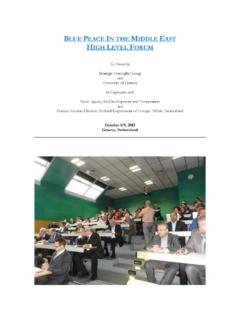Transcription of Better Policies Series - OECD.org
1 Paris2, rue Andr Pascal, 75775 Paris Cedex 16 Tel.: +33 1 45 24 82 00 Better Policies SeriesPROMOTING GREEN AND INCLUSIVE GROWTH IN CANADAJune 2016 This document is published on the responsibility of the Secretary-General of the OECD. The opinions expressed and arguments employed herein do not necessarily reflect the official views of OECD member countries.**This document and any map included herein are without prejudice to the status of or sovereignty over any territory, to the delimitation of international frontiers and boundaries and to the name of any territory, city or statistical data for Israel are supplied by and under the responsibility of the relevant Israeli authorities. The use of such data by the OECD is without prejudice to the status of the Golan Heights, East Jerusalem and Israeli settlements in the West Bank under the terms of international law.
2 **This document is part of the Better Policies Series . Under the guidance of Gabriela Ramos and Juan Yermo, Isabell Koske coordinated the publication, with the help of Ewa Klimowicz and Victor Duggan. Contributors: Jonathan Barr, Andrew Bell, Herv Boulhol, David Bradbury, Bert Brys, David Carey, Sean Ennis, Michael Forster, Massimo Geloso Grosso, Peter Jarrett, Gaetan Lafortune, Horacio Levy, Thomas Liebig, Isabelle Luong, Corinne Luu, Rahul Malhotra, Marco Marchese, Andrew McQueen, Catherine Moreddu, Ana Novik, Paul O Brien, Ryan Parmenter, Dirk Pilat, Jonathan Potter, Mikaela Rambali, Angelica Salvi Del Pero, Paul Swaim, Frank Van Tongeren, Elena Tosetto. Isabelle Renaud provided production and administrative credits: to OECD publications may be found on line at: OECD 2016 You can copy, download or print OECD content for your own use, and you can include excerpts from OECD publications, databases and multimedia products in your own documents, presentations, blogs, websites and teaching materials, provided that suitable acknowledgment of the source and copyright owner is given.
3 All requests for public or commercial use and translation rights should be submitted to Requests for permission to photocopy portions of this material for public or commercial use shall be addressed directly to the Copyright Clearance Center (CCC) at or the Centre fran ais d exploitation du droit de copie (CFC) at FOR ECONOMIC CO-OPERATION AND DEVELOPMENTThe OECD is a unique forum where governments work together to address the economic, social and environmental challenges of globalisation. The OECD is also at the forefront of efforts to understand and to help governments respond to new developments and concerns, such as corporate governance, the information economy and the challenges of an ageing population. The Organisation provides a setting where governments can compare policy experiences, seek answers to common problems, identify good practice and work to co-ordinate domestic and international OECD member countries are: Australia, Austria, Belgium, Canada, Chile, the Czech Republic, Denmark, Estonia, Finland, France, Germany, Greece, Hungary, Iceland, Ireland, Israel, Italy, Japan, Korea, Luxembourg, Mexico, the Netherlands, New Zealand, Norway, Poland, Portugal, the Slovak Republic, Slovenia, Spain, Sweden, Switzerland, Turkey, the United Kingdom and the United States.
4 The European Union takes part in the work of the Publishing disseminates widely the results of the Organisation s statistics gathering and research on economic, social and environmental issues, as well as the conventions, guidelines and standards agreed by its Better Policies SeriesThe Organisation for Economic Co-operation and Development (OECD) aims to promote Better Policies for Better lives by providing a forum in which governments gather to share experiences and seek solutions to common problems. We work with our 34 members, key partners and over 100 countries to Better understand what drives economic, social and environmental change in order to foster the well-being of people around the world. The OECD Better Policies Series provides an overview of the key challenges faced by individual countries and our main policy recommendations to address them.
5 Drawing on the OECD s expertise in comparing country experiences and identifying best practices, the Better Policies Series tailor the OECD s policy advice to the specific and timely priorities of member and partner countries, focusing on how governments can make reform happen. Foreword Canada s economy weathered the turmoil of the global financial crisis Better than most other OECD countries, and Canadians enjoy a high quality of life. Household disposable income is above the OECD average and continues to increase. The country also ranks among the top-performing OECD countries on many dimensions of well-being. But there are still areas in which Canada performs less well. Productivity gaps with the best-performing OECD countries are sizeable.
6 Regional disparities are high , and the level of income inequality is close to the OECD average (which has been increasing), as is the level of poverty. Canada can clearly do Better . In particular, there is room to reduce disparities in well-being across provinces and territories and to improve opportunities for some population groups to succeed in life, most notably Indigenous peoples. There is also room to further enhance the skills of the Canadian workforce. Some groups, mostly from socially disadvantaged backgrounds, lack the skills required in modern economies and societies. Canada needs to step up its efforts to fight climate change. Canadian greenhouse gas emissions are among the highest in the OECD on a per capita basis.
7 Without a change in current Policies , the country will not meet the target of reducing 2005 emissions by 30% by 2030. This is crucial at the current juncture, when all governments around the world need to agree on a common strategy to limit global warming to below 2 degrees. Moreover, the success story of the recent past was at least in part a result of the natural resources boom, which has now come to an end. To maintain economic momentum, reform efforts need to be stepped up. Catching up with the best-performing OECD countries in terms of productivity is crucial in this regard. Investments in infrastructure to avoid congestion and facilitate trade through Better gateway links can also help, provided these investments are focused on high -return projects.
8 The new government of Prime Minister Justin Trudeau is committed to addressing these challenges and improving the well-being of Canadian citizens through stronger, fairer and greener growth. Special emphasis is being given to strengthening the middle class and providing all those who work hard the opportunity to join it. While income data point to a rather small decline in the middle class over time, less than 50% of Canadians perceive themselves as belonging to the middle class, down from almost 70% in the early 2000s, highlighting the importance of this endeavour. Drawing on the experience and expertise of the OECD, this report was prepared to help the new government of Canada with its ambitious reform agenda. It suggests how Canada can improve productivity by adjusting its regulatory framework, its infrastructure and its competition and innovation Policies .
9 It discusses how Canada can reduce unemployment and Better assist those who have lost their jobs due to the end of the natural resources boom. It also addresses the need for more inclusive growth, by further enhancing the skills level of the Canadian workforce and making sure that all Canadians, including Indigenous peoples, have the skills they need to succeed in life. The report also makes suggestions for strengthening the redistributive effects of Canada s tax system without harming growth, and for making the pension and health care systems more inclusive. From a more global perspective, the document also suggests how Canada can reinforce the linkages between Canada s development co-operation efforts and systemic undertakings such as climate change, the Sustainable Development Goals or world trade.
10 The OECD is looking forward to working with the new government of Canada to support its efforts to improve economic, social and environmental outcomes by designing, promoting and implementing Better Policies for Better lives. Angel Gurr a OECD Secretary-General Key observations Canada would benefit from having the increase in the top personal income tax rate accompanied by measures that limit income shifting from labour income to lower-taxed capital income. Preferential taxation of small companies should be reviewed ( in the context of the recently announced federal tax expenditure review) to identify clear market failures and the policy instruments best suited to addressing them. Working with the provinces and the electricity industry to facilitate greater interconnections between provinces (where economic) and, more generally, promote greater integration of Canada's electricity markets could improve competition, enhance system reliability and facilitate the integration of intermittent renewable generation.
















